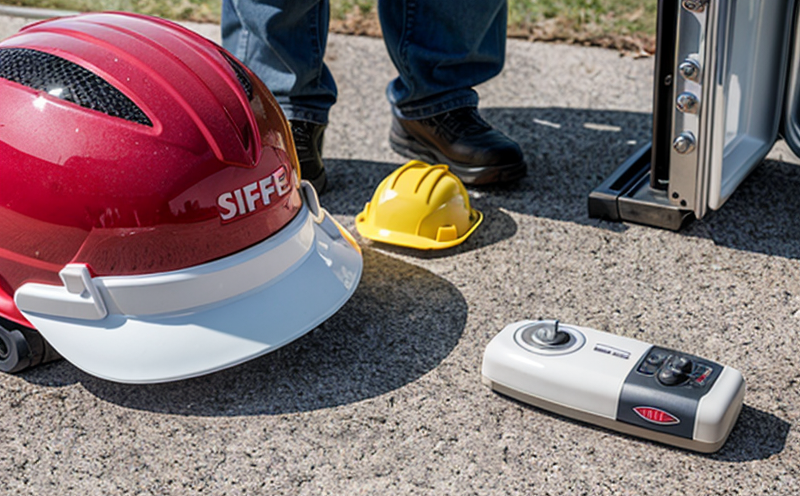ISO 18873 Lifeboat Communication System Testing
The ISO 18873 standard provides a comprehensive framework for testing lifeboat communication systems. This is crucial in ensuring that the communication devices and systems within lifeboats meet the highest safety standards, thereby protecting crew members and enhancing search-and-rescue operations during emergencies at sea.
Lifeboats are vital components of maritime safety infrastructure. They provide evacuation routes from ships in distress and are essential for survival in case of a maritime accident. The ability to communicate effectively is paramount; hence, the design, installation, and testing of lifeboat communication systems are critical. ISO 18873 outlines specific requirements that these systems must meet, ensuring they function reliably under extreme conditions.
The testing process involves multiple stages designed to simulate real-world scenarios where communication might be needed most urgently. This includes tests for waterproofing, durability against harsh environmental factors like salt spray and high temperatures, and performance in various frequencies used by maritime communication devices. The standards also cover interference resistance and signal clarity during transmission.
Proper testing ensures that lifeboats can perform their intended functions effectively when deployed. By adhering to these stringent guidelines, manufacturers are able to produce reliable products that contribute significantly to enhancing maritime safety. Compliance with ISO 18873 not only demonstrates a commitment to quality but also provides peace of mind for stakeholders involved in the shipping industry.
The testing protocol outlined by this standard is designed to assess various aspects including durability against environmental factors such as humidity, salt spray, and extreme temperatures. It ensures that all components operate correctly under these conditions, which are common during a maritime emergency. Additionally, it evaluates the system's ability to withstand physical impacts without compromising functionality.
A significant aspect of ISO 18873 is its emphasis on signal clarity and interference resistance throughout transmission. This ensures that critical information can be accurately conveyed even when faced with challenging conditions at sea. The standard also includes tests for waterproofing, ensuring that the equipment remains operational despite exposure to water during rescue operations.
Compliance with ISO 18873 is essential not only for maintaining regulatory compliance but also for building trust among customers who rely on these safety systems in high-stress situations. Adhering to this standard helps establish a reputation as a leader in maritime safety technology, which can be a competitive advantage in today’s market.
Customer Impact and Satisfaction
The implementation of ISO 18873 Lifeboat Communication System Testing brings tangible benefits to customers by ensuring that they receive high-quality products that meet strict international standards. This enhances customer satisfaction as it reduces the risk associated with substandard equipment, thereby contributing positively to overall maritime safety.
For quality managers and compliance officers responsible for overseeing these systems, adhering to ISO 18873 provides a clear roadmap on how best to ensure product reliability and safety. They can leverage this knowledge to make informed decisions regarding procurement and certification processes, ultimately leading to more efficient operations.
R&D engineers working in the sector will find value in using ISO 18873 as they develop new technologies aimed at improving lifeboat communication systems further. By staying current with industry standards like these, they contribute valuable insights into product improvements that enhance performance and durability.
For procurement teams, this standard offers a reliable benchmark for selecting suppliers who meet the necessary quality criteria. It fosters transparency within supply chains by promoting consistent practices across different manufacturers globally. This ensures that all parties involved are aligned towards achieving common goals related to maritime safety standards.
International Acceptance and Recognition
The ISO 18873 standard enjoys widespread acceptance among marine equipment manufacturers worldwide due to its rigorous testing criteria aimed at ensuring the reliability of lifeboat communication systems. This international recognition underscores the importance placed on maritime safety standards globally.
Countries around the world have adopted these guidelines as a benchmark for assessing compliance with local regulations regarding shipbuilding and maintenance practices. By aligning their processes with ISO 18873, manufacturers demonstrate their commitment to maintaining high standards of quality control throughout production cycles.
Additionally, certification based on this standard adds credibility to products sold internationally, making it easier for companies to expand into new markets without compromising safety expectations set forth by international bodies. This acceptance fosters trust among buyers who prioritize proven performance metrics when purchasing lifeboat communication systems.
Environmental and Sustainability Contributions
- The testing ensures that equipment remains functional even after prolonged exposure to harsh environmental conditions, reducing waste associated with premature failures.
- By promoting durable designs, it supports the principles of sustainable development by encouraging longevity over frequent replacements.
- Waterproofing tests contribute to minimizing pollution caused by discarded electronics and components that fail due to improper design or testing.
The rigorous testing procedures mandated by ISO 18873 help reduce environmental impact while simultaneously enhancing maritime safety. These efforts align with broader sustainability goals, making them an integral part of responsible corporate citizenship within the shipping industry.





